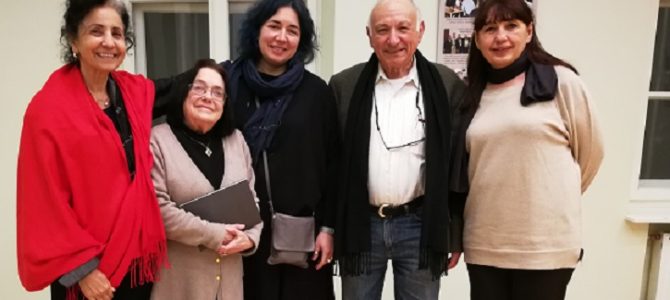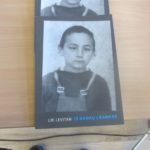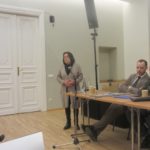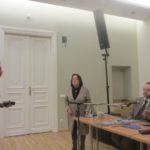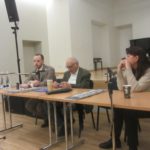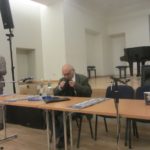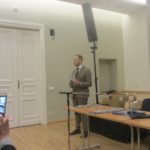The Lithuanian Jewish Community hosted the launch of the Lithuanian translation of an unusual book on February 21. Professor Uri Leviatan’s book “From Hand to Hand” is unlike the academic works by this much-published anthropologist and sociologist who focuses on the modern phenomenon of the Israeli kibbutz. It is his own story, and that of his parents and grand-parents, which he began writing for his son Lior in 2014, the fruit of personal research stretching back decades, in which the author seeks to answer the question of his origins and what exactly happened to him as a child during the Holocaust.
The autobiography reads like a thriller novel and the author himself describes it as a series of detective stories.
Asked to speak about his experience as a child of the Holocaust at a Holocaust survivor and Jewish partisan conference held in Israel in the ’90s, Leviatan realized he had actually been passed from one guardian to another at least seven times. Initially his parents had him smuggled out of the Kaunas ghetto, where they perished, but after that his path to Israel after the war became very foggy in his own mind. Hardly unusual for a child born in 1939 to not remember all of the horror of the Holocaust in his first few years, but Leviatan’s memory gaps seem to have always bothered him, and he managed over the decades to track down real documentation of himself as a Jewish orphan in Lithuania and later at the Sanhedria children’s home in Israel, now sporting a different first name following what he described as his “almost kidnapping” by a Jewish religious group which gathered up Jewish orphans in Europe. This group changed his name, falsified his date of birth and it was only when his aunt, already in Israel, went looking for him and happened to ask another child from Kaunas about Uri that he was rescued.
He found evidence he was taken out of the Soviet Union to Poland after the war by a woman who pretended to be his mother, and a letter his grandmother sent from exile in Siberia asking local authorities in Lithuania to find him. He also found evidence an aunt and uncle were looking for him in post-war Kaunas. Unlike so many children orphaned after the war, Urikh, as he was a known as a child, had real name recognition in Kaunas and Lithuania because of the medical practice of both his grandparents and their son, his father.
Uri Leviatan’s quest to make sense of his own odyssey became inseparable from what people call “searching for roots” because his story was also the story of his family which he hardly knew.
Both paternal grandparents–Isaac and Yeta–studied medicine in Berlin in the first decade of the 20th century, likely met there, and came back to Kaunas, which was still part of the Russian Empire, and set up a practice. Isaac Leviatan was a gynecologist and Yeta, Uri believes, was a dentist. Isaac was also the leader of the A branch of the General Zionists in Kaunas and purchased a plot of land in Palestine as early as 1920, a year after Lithuania declared independence. It was his medical practice, though, which earned him fame at home. Those who worked with him described him as a white angel in a medical smock and said he was such a bright and good man they never forget him their entire lives. He lived on inside them long after his death. The mothers who gave birth in his clinic never forget him, either, and a generation of children grew up knowing they had been born “in Dr. Leviatan’s clinic.” Three such attended the launch of the Lithuanian version of the book at the LJC, including Dalia Epšteinaitė, the historian and author who wrote an incredible introduction to From Hand to Hand. Epšteinaitė said those who were born at Leviatan’s clinic formed a distinct group in Soviet Lithuania, and told several stories about this at the book launch.
Although Isaac and Yeta’s clinic survived as a clinic until almost the 1990s–along with a good deal of their original furniture and equipment–the Soviet reality was unkind to them. As with so many other Jews in Lithuania, Isaac and Yeta were deemed bourgeois enemies of the working class and undesirables, and were deported in early June of 1941. Uri Leviatan has discovered a number of interrogation documents charging his grandfather with supporting Zionism and being a business owner, which his grandfather didn’t deny. The family seems to have been sent to a gulag formerly used to build perhaps the greatest white elephant in Stalin’s USSR, the I. V. Stalin Baltic Sea-White Sea Canal, completed several years earlier at the cost of maybe 10,000 lives and never really used, then on to Solikomsk in the Perm region of Russia. The sentence was 10 years of hard labor for the man and wife doctors.
During the interwar period Dr. Leviatan had taken in a young doctor named Kibarski. During the war Dr. Kibarski served as military doctor in the Lithuanian 16th Division fighting the Nazis. After the war he became the personal physician to Lithuanian Communist Party first secretary Antanas Sniečkus, the nominal leader of the Lithuanian Soviet Socialist Republic within the Soviet Union. Sniečkus’s wife was having trouble getting pregnant, so he asked his doctor what could be done. Kibarski said there was only one man in the Soviet Union who could help, but he was imprisoned in a gulag. In 1947 Isaac and Yeta returned to Lithuania, to Vilnius, Isaac treated Sniečkus’s wife successfully, and life seemed to have returned to normal.
In July, 1950, Isaac Leviatan was arrested again, this time as part of the infamous Jewish Doctors case. The same charges were laid against him as before, and he argued he had already served his sentence for them. His plea was to no avail and he was sent further east, to Kansk in the Krasnoyarsk region in Siberia. This time Yeta wasn’t sentenced to the gulag and was allowed to follow her husband there to provide him with food and medicine. Uri Leviatan found in KGB documents Yeta attempted to enlist Sniečkus’s help again, but said it was apparent the KGB had more real power in Soviet Lithuania than the local Lithuanian Communist Party.
This is only a small part of Uri’s story related in the book.
Uri Leviatan’s grandmother Yeta also moved to Israel after the war. He said he could’ve simply asked her so many things instead of travelling so far to find documentation, but, as with so many Holocaust survivors, they never talked about it.
“I understood that my story is less interesting than that of my family,” Uri told the audience. “I’m really more interested in finding out about them than about myself.”
How was it that both paternal grandparents and their son, Uri’s father, studied medicine abroad and came back to live in Kaunas? Mikhail or Misha Leviatan studied medicine in London. Were they some kind of super-patriots who had to live in Lithuania?
“No, I think they were well-to-do here at that time. It was very comfortable if you had money,” Uri answered the question with a twinkle in his eye.
What about becoming a doctor and setting up a practice in Kaunas?
“That’s what my grandmother always wanted so much. I guess there are some Israeli exchange students studying medicine in Lithuania,” he said.
The book launch lasted one hour and forty-five minutes including the discussion at the end. Lithuanian Jewish Community executive director Renaldas Vaisbrodas provided simultaneous translation in Lithuanian and English to Uri Leviatan, his wife and the entire audience. Victoria Sideraitė-Alon translated the book from Hebrew to Lithuanian and attended the event. Books were offered for sale at a modest price and Uri Leviatan signed them. The Goodwill Foundation supported the translation, compilation and publication of the book. It includes a large number of black-and-white photographs throughout the text. The book is the first a forthcoming series called Arka to feature the biographies of exceptional Litvaks.


